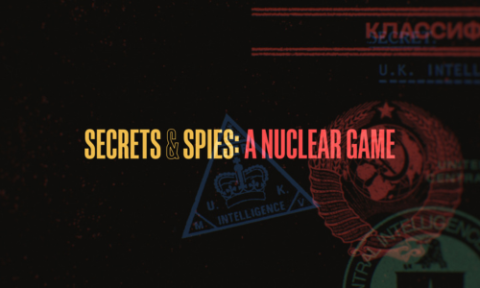History and Politics academics consult for new series on Cold War spies

How was nuclear war narrowly averted by a double agent?
New OU/BBC co-production Secrets and Spies: A Nuclear Game, broadcast over three episodes from Wednesday 8 May at 9pm on BBC Two, and on iPlayer. With unpublished documents and rarely heard archive interviews with the spies involved, former aides to Margaret Thatcher and Ronald Reagan, and former KGB, MI5 and MI6 officers, some of whom have never spoken publicly before, the three-part dramatization explores the dangerous game played out in the 1980s as the world unknowingly teetered on the brink of nuclear war.
Dr Luc-Andre Brunet (Senior Lecturer in Contemporary International History) and Dr Geoff Andrews (Senior Lecturer in Politics) were academic consultants for the series.
Episode 1 introduces two spies who turned double agent at the height of the Cold War standoff between East and West. In Summer 1982, KGB spy Oleg Gordievsky travels from Moscow to take up a post at the Soviet Embassy in London. The Soviet Union’s KGB chief Yuri Andropov is increasingly anxious about the West’s intentions and has established Operation Ryan, an intelligence operation to gather evidence that western leaders are preparing for an attack, and Gordievsky reports directly to him. Against this backdrop, US President Ronald Reagan delivers his historic speech in the Houses of Parliament declaring that the Soviet Union belongs on the ‘ash heap of history.’ This aggressive rhetoric, coupled with Reagan’s bond with British Prime Minister Margaret Thatcher, feeds Andropov’s paranoia as a routine NATO exercise “Abel Archer” begins, war gaming how NATO would manoeuvre in the event of an attack. Now leader of the Soviet Union, Andropov is prepared to launch a pre-emptive nuclear strike. However, Gordievsky is hiding a dangerous secret - he is a double agent...
As well as the secret machinations of the espionage world, the series also explores the impact of the Cold War on ordinary people, such as the British public protests against US nuclear weapons at Greenham Common. Dr Luc-Andre Brunet notes that he “felt it was important for the series to highlight how ordinary citizens felt about Cold War tensions and the likelihood of nuclear war in the early 1980s. This was a time when hundreds of thousands of people marched in London to protest against nuclear weapons and call for more dialogue between East and West. This is an important part of the story if we want to understand the actions of leaders like Thatcher and Reagan.”
The series continues with the unexpected death of Andropov. Impressed with the level of intelligence revealed by the double agent and terrified by a TV movie about a nuclear attack, Reagan takes a softer stance towards the USSR and Thatcher attends Andropov’s funeral where she is disappointed by the new leader, the elderly and hard-line Chernenko. Gordievsky identifies Mikhail Gorbachev as a possible contender, and in December 1984, Gorbachev meets Thatcher in London. With Gordievsky briefing both leaders on what the other is planning and expecting, the meeting is a great success, but Gordievsky’s secret as a double agent may be compromised by a US double agent…
You can explore the Secret History of Espionage Digital Interactive and learn more about the academic consultants for the series, Dr Luc-Andre Brunet and Dr Geoff Andrews, on OU Connect.
Image insert: (c) BBC Studios
Request your prospectus
![]()
Explore our qualifications and courses by requesting one of our prospectuses today.